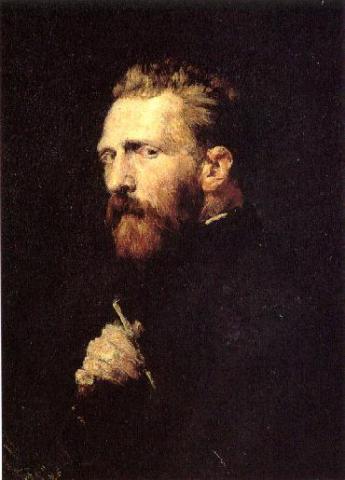-
Table of Contents
- 0. STORY PREFACE
- 1. EARLY LIFE
- 2. AN ARTIST IS BORN
- 3. STUDYING ART, FEELING PAIN
- 4. THE FIRST MASTERPIECE
- 5. THE PARIS YEARS
- 6. INFLUENCE of JAPANESE ART
- 7. EARLY LIFE in ARLES
- 8. THE BANDAGED EAR
- 9. VINCENT at SAINT-REMY
- 10. THE ATTACKS CONTINUE
- 11. PAINTING in AUVERS-sur-OISE
- 12. WORRIES and TURMOIL
- 13. VINCENT COMMITS SUICIDE
- 14. THE SADNESS WILL LAST FOREVER
Vincent van Gogh portrait painted by John Peter Russell in 1886. Currently maintained at the van Gogh Museum in Amsterdam. Online courtesy Wikimedia Commons.
I can't change the fact
that my paintings don't sell.
But the time will come
when people will recognize
that they are worth more than the value
of the paints used in the picture.Vincent van Gogh
(Quoted in Van Gogh, by Ingo F. Walther, page 89)
It was July of 1890. Vincent van Gogh, a Dutch artist living in the French village of Auvers, had created nearly eighty paintings in less than three months.
In recent weeks, he’d been attracted by the fields and plains not far from the Auberge Ravoux Inn where he lived that summer. At the height of his genius, the prolific artist was despondent.
He was thirty-seven years old, financially supported by an ailing brother and had produced more than eight hundred paintings which no one wanted to buy. (It is believed during his entire career he sold only one - The Red Vineyard - which he painted in 1888 and Anna Boch, also an artist, purchased in 1890.)
At dusk on Sunday, the 27th of July, Vincent walked to one of the fields in Auvers-sur-Oise. What happened there abruptly cut short the life of an artist whose paintings today are among the most sought-after - and valuable - in the world.
Who was Vincent? How did he develop his talent? What are we to make of his artistic drive which often propelled him to work at a maniacal pace?
Perhaps we can learn something about the man by examining his letters and paintings. Let’s take a look.


 First Chapter
First Chapter



